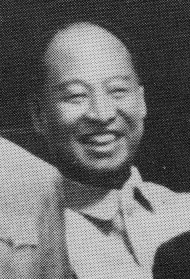Peng Zhen
| Peng Zhen | |
|---|---|
| 彭真 | |

Peng Zhen in 1956
|
|
| Chairman of the Standing Committee of the National People's Congress | |
|
In office June 18, 1983 – April 27, 1988 |
|
| Preceded by | Ye Jianying |
| Succeeded by | Wan Li |
| 1st Secretary of the Central Political and Legal Affairs Commission | |
|
In office March 1980 – May 1983 |
|
| Succeeded by | Chen Pixian |
| First Secretary of the Beijing Committee of the Communist Party of China | |
|
In office December 13, 1948 – May 1966 |
|
| Preceded by | Office created |
| Succeeded by | Li Xuefeng |
| Personal details | |
| Born |
October 12, 1902 Houma, Shanxi, China |
| Died | April 26, 1997 (aged 94) Beijing, China |
| Nationality | Chinese |
| Political party | Communist Party of China |
| Spouse(s) | Zhang Jieqing |
| Peng Zhen | |||||||||
| Chinese | 彭真 | ||||||||
|---|---|---|---|---|---|---|---|---|---|
|
|||||||||
| Transcriptions | |
|---|---|
| Standard Mandarin | |
| Hanyu Pinyin | Péng Zhēn |
| Wade–Giles | P'eng Chen |
Peng Zhen (pronounced [pʰə̌ŋ ʈʂə́n]; October 12, 1902 – April 26, 1997) was a leading member of the Communist Party of China. He led the party organization in Beijing following the victory of the Communists in the Chinese Civil War in 1949, but was purged during the Cultural Revolution for opposing Mao's views on the role of literature in relation to the state. He was rehabilitated under Deng Xiaoping in 1982 along with other 'wrongly accused' officials, and became the inaugural head of the CPC Central Political and Legislative Committee.
Born in Houma, Shanxi province, Peng was originally named Fu Maogong (傅懋恭). He joined the Chinese Communist Party in 1923 as a founding member of the Shanxi Province CP. Arrested in 1929, he continued underground political activities while imprisoned. He was released from prison in 1935 and began organizing a resistance movement against the invading Japanese forces. Around the same time, he was appointed the Organization Department Director of the North Bureau of CPC. He also served on a number of positions as vice-president of the Central Party School and director of the CPC Policy Research Office. In 1945 he served in the history research committee and the organizing committee of the Communist Party's 7th National Congress.
In September 1945 Peng was sent by Mao Zedong to take up overall leadership of the Communists in Northeast China. He was accompanied by Lin Biao who was to assist Peng with directing military operations against the Nationalists. Peng decided that the Communists could hold the 3 big cities of the Northeast: Shenyang, Changchun and Harbin. When the Nationalists under the command of Du Yuming attacked in November 1945, the Communists were forced back. Peng was removed as Communist leader in the northeast after further failure by Lin Biao's forces in March 1946 led to the Communists retreat back to Harbin.
...
Wikipedia
